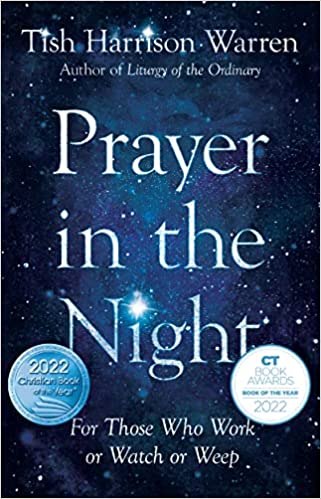This week we are discussing Chapter 6 “Give Your Angels Charge Over Those Who Sleep: Cosmos and Commonplace” of the Rev. Tish Harrison Warren’s book Prayer in the Night: For Those Who Work or Watch or Weep. This is the first chapter of Part Three: Taxonomy of Vulnerability.
The Prayer:
Keep watch, dear Lord, with those who work, or watch, or
weep this night, and give your angels charge over those who
sleep. Tend the sick, Lord Christ; give rest to the weary, bless
the dying, soothe the suffering, pity the afflicted, shield the
joyous; and all for your love’s sake. Amen.
1979 BCP 134
Angels?:
The prayer asks that angels keep watch over those who sleep. Rev. Warren begins this chapter with the question of whether we actually believe in angels, and whether after the Enlightenment and living in a scientifically saturated world, can we still reasonably believe in angels. At least for me growing up (in the Methodist church), angels made only a brief appearance during the children’s Christmas pageant and sometimes in some hymns. But, generally, angels were completely absent from the worship service and our teachings. Until our study group’s advent lesson on angels in 2013, I do not think I had ever had any teaching on angels specifically.
I probably learned more about ghosts than angels growing up. For most of my life, I generally regarded angels as basically Christian mythological beings more akin to elves and dwarves than having any real existence. Angels may exist in Hallmark stores or in the movies, but really nowhere else. As Rev. Warren points out, in our modern world, angels, at best, have “become silly sentimentalized into parody.” p.84. But no one (including most ordained clergy) really believes in angels sufficiently to talk about them in reality. p.85.
But, when we look at the historic teachings of the church, angels are everywhere. The universe is full of angels. It can be argued that the existence of angels (particularly the fallen kind) is the very foundation of Paul’s teachings. In the fifth century, Dionysius writes The Celestial Hierarchy detailing the three orders of angels, to wit: High (Seraphim, Cherubim, Thrones); Middle (Dominions, Virtues, Powers); and Low (Principalities, Archangels, Angels). (His work is where we get the word hierarchy from.) In the middle ages, Aquinas gives us his proofs for the existence and nature of angels. Even in the Reformation, John Calvin dedicates a whole chapter of his Institutes to a discussion of angels. (Book I, Ch. 14). A good discussion of the historic understanding of angels is here and here.
Lex Orandi, Lex Credendi:
In her understanding of angels, Rev. Warren writes about how “prayer often precedes belief.” p.86 An ancient Christian saying is lex orandi, lex credendi – the rule of prayer is the rule of belief. In other words, as the Episcopal Church teaches “this phrase describes the pervasive pastoral reality that habits of prayer shape Christian belief and official provisions for worship can thus have a determinative role in shaping Christian doctrine.”
Every Sunday, we affirm that in our worship that we “are joining our voices with Angels and Archangels and with all the company of heaven.” 1979 BCP 362. Every Sunday, the preface to the Sanctus requires that we open our mind’s eye and see that it is not just we who sing this hymn, but that we are joined by a whole company of angels as well. It is also, as Rev. Warren points out, not simply I who sing, but all of us present. “We believe together.” p.87. So that on those days when “I show up at church with my doubts and I’m kind of counting on you to sing for me.” p.87.
When we pray about angels and when we pray to invoke angels, our prayers recognize their reality. Out prayers recognize that the universe is not merely empty space, but full of this entire company of heaven. “Prayer calls us into supernatural reality” and of those things both seen and unseen. p.88. Therefore, as we pray our prayers this Sunday, be attentive to the angels.
Questions and Practices:
Rev. Warren’s suggested questions and practices for chapter 6 are:
1. Have you ever encountered anything unexplained, or a spiritual being-an angel, a ghost, a demon? How is the supernatural regarded in your current circles? How was it regarded in your circles growing up?
2. The author says that prayer often precedes belief. Was there a time that prayer or another spiritual practice preceded belief for you or for your children?
3. What are your sleep habits like? Have you ever figured out a problem you were struggling with or had a concept become clear after you slept?
Dinner is at 6. The menu is a special Valentine’s Day dinner of tenderloin, crabcakes, and roasted Brussels sprouts. RSVP Required. Discussion about 7. Compline at 8.
Everlasting God, you have ordained and constituted in a wonderful order the ministries of angels and mortals: Mercifully grant that, as your holy angels always serve and worship you in heaven, so by your appointment they may help and defend us here on earth; through Jesus Christ our Lord, who lives and reigns with you and the Holy Spirit, one God, for ever and ever. Amen.
1979 BCP 251


Pingback: The Gospel of Luke – Luke 2: The Nativity – Ancient Anglican